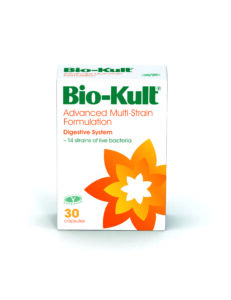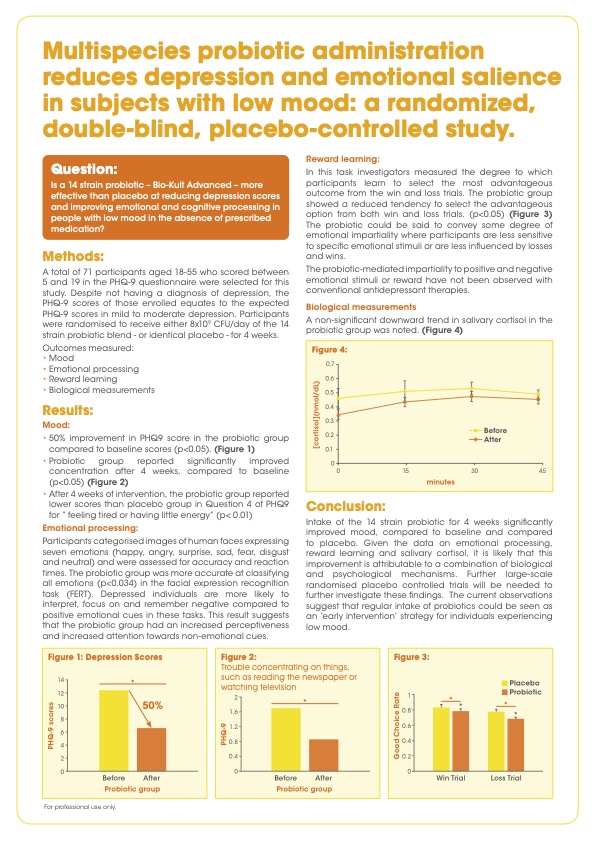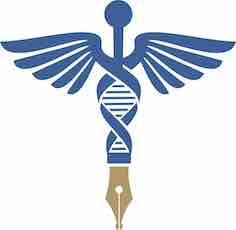Sponsored content:

Bio-Kult was used in the placebo controlled RCT.
Taking a probiotic for just four weeks improves mood, emotional processing and our ability to read faces new research by scientists at the University of Oxford has shown.
A total of 71 adults, aged 18-55, took part in the randomised double-blind, placebo-controlled study — the gold standard for medical research — which has just been published in the high impact peer-reviewed journal Psychological Medicine.
At the end of the four-week trial, participants performed a series of tasks to measure their emotional processing and cognitive function and compared to those given the placebo those taking the probiotic showed:
- Greater accuracy (12%) at identifying and classifying facial expressions
- Improved scores for concentration and tiredness
- Increased perceptiveness and attention towards non-emotional cues
Participants taking the “gut friendly” bacteria also recorded a near 50% reduction in depression scores.
This dramatic improvements in scores for depression further strengthens the findings of previous research and adds to the growing body of evidence indicating that gut microbiome can have a significant and meaningful impact on mood.
Associate Professor Phil Burnet, from the Department of Psychiatry at Oxford University commented, “Our findings suggest that probiotics could be used as an early intervention to help reduce the risk of people with mild to moderate depression developing a major depressive disorder, which is more debilitating and often difficult to treat.”
The improvements in emotional processing observed in the probiotic group sheds new light on the idea that we can ‘trust our gut’.
Victoria Collard a research psychologist and associate lecturer at the Open University said,
“Being able to read faces is absolutely crucial for us to understand emotional cues quickly, especially if we’re in a high-pressure meeting.”
Otherwise healthy adults with self-identified low mood, who were shown to have mild to moderate depression based on recognised clinical tests for depression were selected for the study, as depressed individuals are more likely to interpret, focus on and remember negative compared to positive emotional cues. As a result, any changes could be easily detected in a relatively short timeframe. None of the participants were taking antidepressants or any other mood-altering medication.
Collard said, “We know that there is a lot of truth in the adage that a healthy body leads to a healthy mind. These findings are really interesting in terms of shedding light on role that probiotics might play in protecting our mental health.
As well as the cognitive and emotional data, the research team, led by clinical psychologist Dr Rita Baião, also measured a range of biological factors including saliva levels of the stress hormone cortisol, sleep activity, and blood levels of C-reactive protein — a recognised marker for inflammation. There was a slight reduction in cortisol in the probiotic group, but no other differences between the probiotic group and those taking the placebo.
The researchers propose a number of possible explanations for the impact probiotics have on mood and our ability to process information:
- “It is reasonable to suggest that the probiotic we used influenced central GABA neurotransmission.” (GABA is one of the brain’s main signaling molecules)
- “Subjects with moderate depression in the current study may have had a pre-existing deficit in central 5-HT levels which was restored by the B. longum, contained within the probiotic used.” (5-HT is another name for serotonin, another signaling molecules which impacts mood)
- “A probiotic that contains several species of bacteria may be expected to impart several effects on host neurochemical and physiological pathways, and so the impact of the current probiotic on central dopamine which is also influenced by gut microbiota cannot be ruled out.” (Dopamine is a chemical messenger associated with mood and motivation.)
The changes in emotional processing associated with probiotics are quite different from those seen with antidepressants and Dr Baião concludes, “Probiotic administration may be an ‘early intervention’ strategy to reduce the risk of people with mild to moderate depression developing a major depressive disorder.”
Associate Professor Burnet stressed that probiotics are not a replacement for prescription medicines and psychological therapies, but added, “People with moderate depression are often reluctant to seek medical help as they may be worried about taking medication”.
The probiotic used in the study was Bio-Kult®, 2 capsules per day (66 pence per day). The RRP is £19.94 for a pack of 60 capsules
For further press information please contact Entice Communications on 020 8959 3656 or email
Notes to Editors:
About ADM Protexin Limited
ADM Protexin Limited – known as its umbrella brand Protexin – is part of the ADM Nutrition division. Based in Somerset, UK, the company offers innovative, research-based, natural healthcare and probiotic supplements for human, pet and production-animal use with distribution in over 90 countries.
The Protexin brand includes the Bio-Kult® and Lepicol® ranges for gut health support and more. ADM Protexin Limited works closely with leading universities, hospitals and research centres around the world, ensuring it remains at the forefront of microbiome research. ADM Protexin’s recent award wins include Probiotic of the Year with Bio-Kult Migréa and Innovation for Functional Foods Award for Bacillus subtilis PXN 21 (found in the original Bio-Kult, Bio-Kult Boosted, Bio-Kult Migréa Bio-Kult Brighten and at its highest CFU count in Bio-Kult Mind) at the Nutraingredients Awards 2020. Learn more at www.protexin.com
The leading product in the Bio-Kult range is a scientifically developed, advanced multi-strain formulation containing 14 live bacterial cultures which are proven to survive the high acidity of the stomach. Bio-Kult does not need to be refrigerated and is suitable to be taken alongside antibiotics, by children three years+, when travelling, by vegetarians, as part of a healthy diet and when pregnant. The beneficial bacteria in Bio-Kult help to re-establish and re-balance the gut microflora.
The rest of the Bio-Kult range includes Bio-Kult Candéa with garlic and grapefruit extract targeting the gut and intimate flora, Bio-Kult Pro-Cyan, with cranberry and vitamin A targeting the urinary tract, Bio-Kult Migréa with magnesium and vitamin B6 targeting the head, Bio-Kult Mind with grape and wild blueberry extracts as well as zinc, targeting cognitive function, Bio-Kult Boosted with vitamin B12 and Bio-Kult S. Boulardii with Preplex® and vitamin D, both targeting the digestive and immune systems and Bio-Kult Pregnéa, with folate, vitamins D+C, zinc and magnesium to support women through pregnancy. And now the latest addition to the range, Bio-Kult Brighten, with vitamins B6, B12, D and zinc targeting your inner smile. The Bio-Kult range is suitable for vegetarians, can be swallowed whole or pulled apart and mixed with food or in a drink and does not need to be refrigerated.
What are Probiotics?
Probiotics are live microorganisms which when administered in adequate amounts confer a health benefit on the host (FAO/WHO, 2002). The trillions of microflora that can be found in the human gastrointestinal tract play an essential role in supporting and maintaining strong immune and digestive systems, so having the optimum balance of these beneficial bacteria is important. A number of factors can compromise this balance, including antibiotic therapy, infection, stress, travel or a period of unhealthy nutrition or lifestyle. An effective solution is to supplement the microflora by taking a live bacteria (probiotic) or yeast supplement to help restore the balance.
Click here to see the paper in full.
Click here to read University of Oxford post on the study.
INFOGRAPHIC BELOW FOR FURTHER INFORMATION ONLY, NOT FOR PUBLICATION




Recent Comments